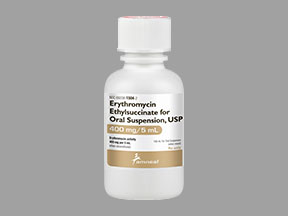
Eryped 400 Coupons & Savings Card – Discount Prices from $79.46
Brand for: Erythromycin ethylsuccinate
My prescription
Edit
100ML of 400MG/5ML, Erythromycin Ethylsuccinate (1 Bottle)
Select pharmacy

CVS
$79.46
COUPON PRICE
Walgreens
$185.23
COUPON PRICE
Albertsons
$187.94
COUPON PRICE
Walmart
$271.25
COUPON PRICEEryped 400 savings card
Show this card to your pharmacist
CVS
$79.46
BIN
ID
PCN
GRP
019876
LH7EBA9A39
CHIPPO
LHX
Powered by
More prescriptions for urinary tract infection
More prescriptions for urinary tract infection
Price history for Eryped 400 (brand) & Erythromycin Ethylsuccinate (generic)
1 Bottle, 100ML of 400MG/5ML
Average retail price for Eryped 400
Average retail price for Erythromycin Ethylsuccinate
Average SaveHealth price for Erythromycin Ethylsuccinate
Our price history data is based on aggregated prescription data collected from participating pharmacies in America. Our prescription data updates daily to reflect the latest price changes. If you notice a missing data point, it means there wasn't sufficient data available to generate a monetary value for that date.
Over the last 12 months, the average discount price of Eryped 400 is $261.18 using the SaveHealth savings card. That's an average savings of 66.34% on Eryped 400 with our discount card.
*Retail prices are based on pharmacy claims data, and may not be accurate when we don't have enough claims.
Eryped 400 (Erythromycin Ethylsuccinate) dosage forms
Dosage Quantity Price from Per unit 100ML of 400MG/5ML 1 Bottle $79.46 $79.46 100ML of 400MG/5ML 2 Bottles $140.62 $70.31 100ML of 400MG/5ML 3 Bottles $201.78 $67.26
| Dosage | Quantity | Price from | Per unit |
|---|---|---|---|
| 100ML of 400MG/5ML | 1 Bottle | $79.46 | $79.46 |
| 100ML of 400MG/5ML | 2 Bottles | $140.62 | $70.31 |
| 100ML of 400MG/5ML | 3 Bottles | $201.78 | $67.26 |
What is the generic name for eryped?
The generic name for Eryped is erythromycin.
What is erythroped used for?
Erythroped is used to treat bacterial infections. It contains erythromycin, which is an antibiotic that helps stop the growth of bacteria. It is commonly prescribed for respiratory tract infections, skin infections, and other bacterial infections.
What is the generic for EryPed?
The generic name for EryPed is erythromycin.
